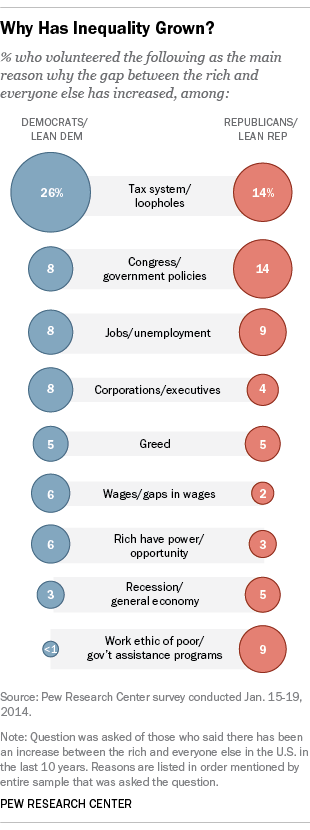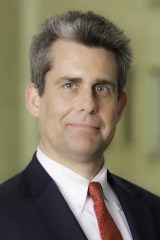
Issues of economic inequality (however one defines it) are a part of the public discussion in a way they haven’t been for a long time, driven both by economists such as Thomas Piketty and people’s own experiences since the 2007-09 global financial panic. Americans have few doubts that inequality has grown: In a Pew Research Center survey from January, about two-thirds of respondents (65%) said the gap between the rich and everyone else has increased over the past decade, versus just 8% who said it’s decreased.
But ask people why the gap has grown, and their answers are all over the place.
Among people who said the gap between the rich and everyone else has grown, we asked an “open-ended question” — what, in their own words, the main reason was. About a fifth (20%) said tax loopholes (or, more generally, tax laws skewed to favor the rich) were the main reason. Ten percent pinned the blame on Congress or government policies more broadly; about as many (9%) cited the lackluster job market, while 6% named corporations or business executives.
But well over half of the people who saw a widening gap cited a host of other reasons, among them (in no particular order): Obama and Democrats, Bush and Republicans, the education system, the capitalist system, the stock market, banks, lobbyists, the strong/weak work ethic of the rich/poor, too much public assistance, not enough public assistance, over-regulation, under-regulation, the rich having more power and opportunity, the rich not spending enough, and simply “a lot of greedy people out there.”
Here’s a sampling of the comments our respondents made:
- “I think the wealthy have political clout that protects them from fair taxation.”
- “Congress favors laws that help them accumulate wealth. Congress is bought by money.”
- “Bringing in immigration has a lot to do with it.”
- “The internet has made a lot of people richer.”
- “Greedy people in positions such as banking.”
- “Economics drilled our manufacturing jobs offshore. The middle class will continue to shrink until we can get some of those jobs back in the country.”
- “It takes money to make money, and they have the money to make it.”
Within the welter of responses, there were some clear partisan distinctions. More than a quarter (26%) of self-identified Democrats and those who lean Democratic cited the tax system as a main reason for the gap. Just 14% of self-identified Republicans and those who lean Republican said the same. Among self-identified liberal Democrats, roughly a third (32%) cited taxes. By contrast, Republicans and Republican-leaning independents were more likely (14%) to mention Congress or government policies than Democrats (8%). About one-in-ten (9%) Republicans and GOP-leaning independents cited poor people’s work ethic and government assistance programs, compared with less than 1% of Democrats who said that.
